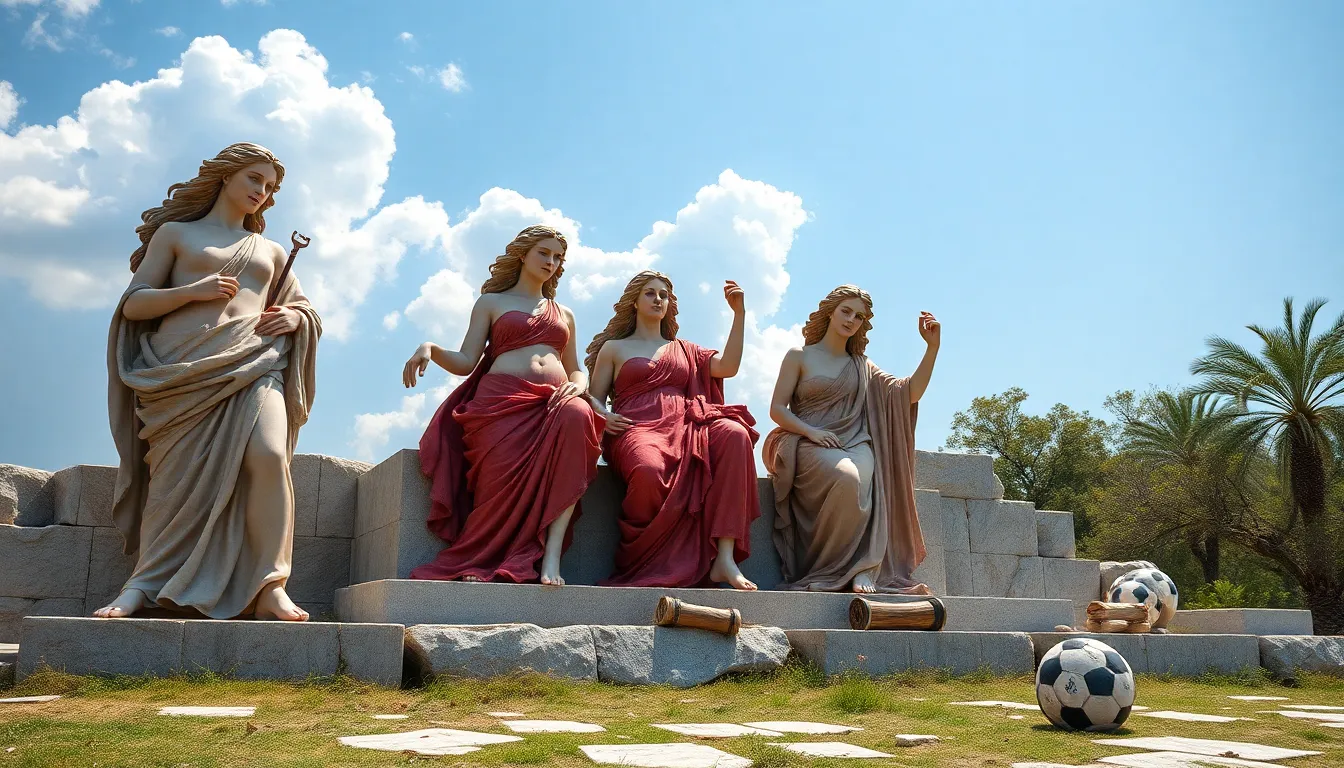The Muses and Their Connection to Philosophy and Thought
I. Introduction
The Muses, in Greek mythology, are the nine goddesses who embody the arts and sciences. They are often invoked by poets, philosophers, and artists seeking inspiration. Each Muse is associated with a specific domain of creativity, representing a unique aspect of human thought and expression.
The significance of the Muses extends beyond the realm of arts; they are also deeply connected to philosophy and intellectual inquiry. This article aims to explore the interplay between the Muses and philosophical thought, highlighting how these divine figures have influenced both creative pursuits and the quest for knowledge throughout history.
II. The Historical Context of the Muses
The origins of the Muses can be traced back to ancient Greece, where they were worshipped as the goddesses of inspiration. Traditionally believed to reside on Mount Helicon, they were often depicted in art and literature as beautiful young women, each representing a different aspect of the arts.
The Muses played a crucial role in various fields:
- Literature: They inspired epic poets like Homer, who called upon them in the opening lines of his works.
- Art: Artists sought their guidance to create masterpieces that reflected the beauty of the world.
- Philosophy: Philosophers invoked the Muses to seek wisdom and understanding in their inquiries.
Key historical figures, such as Plato and Socrates, often referred to the Muses in their dialogues, illustrating their profound impact on philosophical thought.
III. The Muses and the Creative Process
The Muses are often seen as the source of inspiration for artistic and intellectual endeavors. They represent the spark of creativity that ignites the imagination, leading to the creation of literature, art, and philosophical ideas.
The relationship between creativity and philosophical inquiry is intricate. Both require a deep exploration of the human experience, and both can be influenced by external inspiration, such as that provided by the Muses. This connection is evident in:
- Philosophers: Many philosophers, such as Aristotle, have acknowledged the role of inspiration in their work.
- Artists: Visual artists and musicians have often credited the Muses for their creative breakthroughs.
Case studies of notable figures, such as the poet Pindar and the philosopher Heraclitus, reveal how the Muses guided their thoughts and expressions, reinforcing the notion that creativity and philosophy are intertwined.
IV. The Muses as Symbols of Knowledge
Each Muse governs a specific domain, embodying different types of knowledge and artistic expression. Their domains include:
- Calliope: Epic poetry and eloquence
- Clio: History
- Erato: Lyric poetry
- Euterpe: Music
- Melpomene: Tragedy
- Polyhymnia: Sacred poetry
- Terpsichore: Dance
- Thalia: Comedy
- Urania: Astronomy
The philosophical implications of each domain are vast, suggesting that knowledge can be attained through various forms of artistic expression. The Muses also symbolize the idea that knowledge is a form of divine inspiration, encouraging individuals to pursue wisdom and understanding.
V. Philosophical Interpretations of the Muses
Ancient philosophers had varied views on the Muses and their significance. Plato, for instance, considered them essential for the pursuit of truth and beauty. In his dialogues, he often reflects on the nature of inspiration and its connection to the divine.
In particular, the role of the Muses in Plato’s works is significant. He viewed them as intermediaries that connect humanity to the realm of ideas and forms. This perspective emphasizes the importance of inspiration in philosophical thought.
Modern philosophers continue to explore the concept of inspiration and creativity, often referencing the Muses as symbolic figures representing the quest for knowledge. They remind us that the creative process is not merely an individual endeavor but can be a collective journey aided by external forces.
VI. The Muses in Literature and Poetry
The Muses have been referenced extensively in literature and poetry throughout history. Writers have often called upon them to invoke their creative spirit.
Literary references to the Muses include:
- Homer’s invocation of the Muses in the “Iliad” and “Odyssey.”
- Virgil’s homage to the Muses in the “Aeneid.”
- Renaissance poets, such as Milton and Spenser, who sought inspiration from the Muses.
Additionally, the Muses serve as muses for philosophical poets, who blend artistic expression with deep philosophical inquiry. Notable works that embody the Muse’s influence include:
- Wordsworth’s “Lines Composed a Few Miles Above Tintern Abbey”
- Keats’ “Ode to a Nightingale”
- Nietzsche’s “Thus Spoke Zarathustra”
These works reflect the profound impact of the Muses on the creative process, merging artistic beauty with philosophical exploration.
VII. The Contemporary Relevance of the Muses
Today, the Muses continue to inspire modern philosophy and art. Contemporary thinkers draw upon the legacy of the Muses to explore themes of creativity and thought. They remind us that inspiration is a vital component of intellectual exploration.
The role of the Muses in today’s conversations about creativity includes:
- Encouraging interdisciplinary approaches to knowledge, blending art and philosophy.
- Promoting the idea that creativity is essential for innovation and problem-solving.
- Fostering environments that celebrate artistic expression as a means of understanding complex philosophical ideas.
The Muses serve as a reminder that the pursuit of knowledge is not solely an analytical endeavor but also an artistic one, enriching the human experience.
VIII. Conclusion
In summary, the Muses hold a significant place in the realms of philosophy and thought. Their connection to creativity and inspiration underscores the importance of artistic expression in the pursuit of knowledge. The enduring legacy of the Muses encourages us to appreciate the interplay between inspiration and intellectual exploration.
As we continue to navigate the complex landscape of creativity and thought, let us remember the Muses and their role in guiding our quests for wisdom and understanding.




